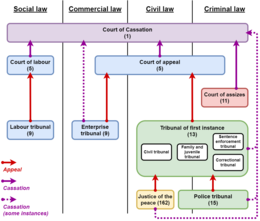 |
|---|
|
|


The police tribunal (Dutch: politierechtbank, French: tribunal de police, German: Polizeigericht) is the traffic court and trial court which tries minor contraventions in the judicial system of Belgium. It is the lowest Belgian court with criminal jurisdiction (in addition to some limited civil jurisdiction). There is a police tribunal for each judicial arrondissement ("district"), except for Brussels-Halle-Vilvoorde, where there are multiple police tribunals due to the area's sensitive linguistic situation. Most of them hear cases in multiple seats per arrondissement. As of 2018, there are 15 police tribunals in total, who hear cases in 38 seats. Further below, an overview is provided of all seats of the police tribunal per judicial arrondissement.[1][2]
A police tribunal is chaired by a judge of the police tribunal, more commonly called police judge (Dutch: politierechter, French: juge de police, German: Polizeirichter). Police judges are professional, law-trained magistrates who are, like all judges in Belgium, appointed for life until their retirement age. The police judges hear cases as single judges, but are always assisted by a clerk. There is also a prosecutor from the public prosecutor's office present who prosecutes (suspected) offenders in the criminal cases the police tribunal hears. The defendants, as well as any victim seeking civil damages, can be assisted or represented by counsel, but this is not required. Lawyers or notaries can act as locum tenens police judge whenever a judge is absent. The organisation of the police tribunals and the applicable rules of civil procedure and criminal procedure are laid down in the Belgian Judicial Code and the Belgian Code of Criminal Procedure. Mind the fact that, despite their name, the police tribunals are not organisationally related to the police.[1][2][3]
- ^ a b "Politierechtbank" [Police tribunal]. www.tribunaux-rechtbanken.be (in Dutch). College of the courts and tribunals of Belgium. Retrieved 3 May 2019.
- ^ a b "Judiciary – Organization" (PDF). www.dekamer.be. Parliamentary information sheet № 22.00. Belgian Chamber of Representatives. 1 June 2014. Retrieved 3 May 2019.
- ^ "Judiciary – Breakdown of law" (PDF). www.dekamer.be. Parliamentary information sheet № 21.00. Belgian Chamber of Representatives. 26 June 2014. Retrieved 3 May 2019.